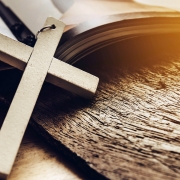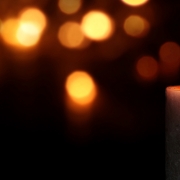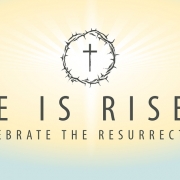Homily – III Sunday of Easter – A – 2020
You may ask how I pass my time in this time of confinement? One of the activities filling up my time as of late is putting the eighth graders of our parish on the hot seat. It’s no wonder why the Church calls the preparation of adults intending to be baptized and join the Catholic Church, “the scrutinies.” As I scrutinize the confirmandi for pertinent knowledge of the faith they are to be confirmed in, one of my go-to questions of recent is, ‘When did the power the Resurrection enter into the disciples’ life?’
I’m not talking about Jesus rising from the dead being good drama and warming our hearts with a good story, but rather, ‘When did that event become something practical, personal, applicable and not just inspirational?’
Baptism connects us to the power of Easter Sunday. Notice here in the first part of today’s Gospel passage that the disciples are on the way to Emmaus. We got to figure that they are already baptized. It was the first thing that Jesus did to begin His ministry (the Baptism of the Lord). Then again on the last night of His ministry with His followers (the Last Supper) He says that He must wash their feet. Peter protests. “‘You will never wash my feet.’ Jesus answered him, ‘Unless I wash you, you will have no inheritance with me.’ Simon Peter said to him, ‘Master, then not only my feet, but my hands and head as well.’ Jesus said to him, ‘Whoever has bathed has no need except to have his feet washed, for he is clean all over; so you are clean, but not all.’” (Jn 13:8-10) Jesus responds that those who are washed only need their feet clean. He is speaking of the washing of the disciples through baptism. Since we can’t be baptized again. Maybe the feet part is a reference to the Sacrament of Confession?
Throughout the Sundays of the Easter Season, the gospel passages reveal encounters of the disciples with the wonderfully mysterious presence of the resurrected Jesus. Last week we heard the dramatic account of Thomas placing his hands in the nail marks in the Body that just mysteriously passed through a locked door. He appears in flesh and blood, to see and to touch. He even eats and prepares meals for them. But at the same time, He can be unrecognizable like He is with the disciples on the way to Emmaus or Mary Magdalene who mistook Him for a gardener. Nevertheless, this mysteriously wonderful Body of Jesus always leaves the disciples with great joy.
Many today are content to say that ‘Jesus was a great man, a great teacher, he was a prophet, but his disciples got carried away and made him a god.’ No wonder there is a lot less wonder in the world. They’ve rejected the saving power of Jesus. He is the one source through Whom we arrive at salvation. “Whoever believes and is baptized will be saved; whoever does not believe will be condemned.” (Mk 16:16) He is the standard of all our actions. “Amen, I say to you, whatever you did for one of these least brothers of mine, you did for me.” (Mt 25:40)
To accept Jesus as merely a prophet compromises heaven. One might begin to believe that death is the only end. This may lead us to think that there is no consequence to our lives because we ultimately end up as worm food. Take the disciples of the gospel today for an example. When they speak of Jesus as a prophet they are rather down-hearted, “The things that happened to Jesus the Nazarene, who was a prophet mighty in deed and word before God and all the people, how our chief priests and rulers both handed him over to a sentence of death and crucified him. But we were hoping that he would be the one to redeem Israel…” Their hearts are heavy. But, as we continue the passage, there is a great change in the disciples. “Were not our hearts burning within us while he spoke to us on the way and opened the Scriptures to us?”
The good news is that the joy that they encounter is not limited to them alone. What St. Luke has provided for us is an outline for all disciples to encounter the Risen Lord. Firstly, there is a scripture lesson. Sacred Scripture is the warm up. It is how we come to know God’s plan. Jesus interpreted the Old Testament and applied it to their present circumstance. We follow a similar pattern today. It is how we begin Mass. We gather to hear the Liturgy of the Word. When I read the Gospel to you, I declare, “The Gospel according to …” And you respond, “Glory to you O Lord.” Then, silently we make three signs of the cross. The idea is that we wish to have Christ’s words in our minds, on our lips and in our hearts. We want Him in our hearts like these disciples.
After Jesus shares and explains Sacred Scripture to His followers, He shares a meal with them. It’s at the breaking of bread that they realized Who He is. Let’s take note, their disposition, regarding Jesus as a prophet, is dejection and anxiety. Their disposition upon seeing Him at the breaking of bread is joy, excitement and a desire to share the news. “So they set out at once and returned to Jerusalem…”
What a great opportunity that we have at Mass! Hopefully this absence from Mass for many will help more appreciate the Eucharistic manner that Jesus intends to use to be a part of our lives. Even for those who are unable to receive Holy Communion for a variety of reason that are present even if we are not sheltering in place, consider that the disciples in today’s Gospel are merely watching the Breaking the Bread and they were filled with excitement. It was a Mass on TV moment. I read in an article regarding how the Church as been in the situation where Mass was suspended for fear of contagious disease before. The great reformer of the Church and founder of seminaries, the Archbishop of Milan, St. Charles Borromeo, shut down the churches in that city during a plague. During this time he encouraged his priest to say Mass at the intersections of the city so that people could witness it from their homes. Our mere participation outside of receiving Holy Communion is efficacious.
Another important aspect of these disciples on the Road to Emmaus is that they expressed hope that Jesus was the one. “We were hoping he would be the one to redeem Israel.” This is further evidence of their Baptism. We receive the gifts, the theological virtues of Faith, Hope and Charity at Baptism. These disciples seemed to have built a life around this hope. They had left homes, businesses and family to follow Jesus.
If our hopes are on the Lord, then we too should feel our hearts warm up to His word. Once we place our hope on pay-raises, promotions, new technologies, political leaders, stock market, entertainment or vacations to bring us security, joy or peace then we become less enamored or ardently desirous of the Lord. We might believe in His Resurrection, but do we believe that this means He is here for us now?
He has risen and is now here in a mysterious way to strengthen, encourage, enlighten, give us hope and fill us with joy, but as we learned sometime ago in catechism class we have to prepare ourselves. First we’re baptized, then we confess our sins, and we learn of the need communicate with God regularly through prayer and to even have time for making sacrifices, such as, fasting. Take another sacrament such as, Holy Matrimony. There we know that bride and groom become one flesh. Their conjugal relations bring them together not only physically. Such relations are enhanced through regular conversations. What we would their union be like if they didn’t talk all week long, show up with no preparation, and expect to have an ecstatic physical moment?
It would hardly be what that act is designed to be. It might give life, but would it convey love? Would it communicate or give assurance that this is the person with whom I want to build a life? Then again it might be a sin, a moment to end the relationship. I.e. To force the issue without consent is a violation on the deepest levels.
There is a similarity with receiving Holy Communion unworthily. This is why St. Paul teaches the Corinthians, “For anyone who eats and drinks without discerning the body, eats and drinks judgment on himself.” (1Cor 11:29) They are abusing a gift and in turn destroying the relationship that is designed to be sustained by the reception of Holy Communion. He concludes that this is the reason for mortalities, “That is why many among you are ill and infirm, and a considerable number are dying.” (1Cor 11:30) This is why the Church teaches that it is a mortal sin to receive unworthily.
Communion is meant to be our personal moment with God. St. Paul also says that if you accept Jesus personally, you’re saved, “if you confess with your mouth that Jesus is Lord and believe in your heart that God raised him from the dead, you will be saved.” (Rm 10:9) Our Protestant friends think that this is it. The only thing that is necessary. If our Protestant friend should ask us, ‘Have you accepted Jesus as your personal Lord and Savior?’ Our response should be a resounding, ‘Yes! I have welcomed Him into my life, into my body and dinned with Him.’ How much more personal can one get?
In the Breaking of the Bread we meet the wonderfully mysterious Body of the Resurrected Lord.



